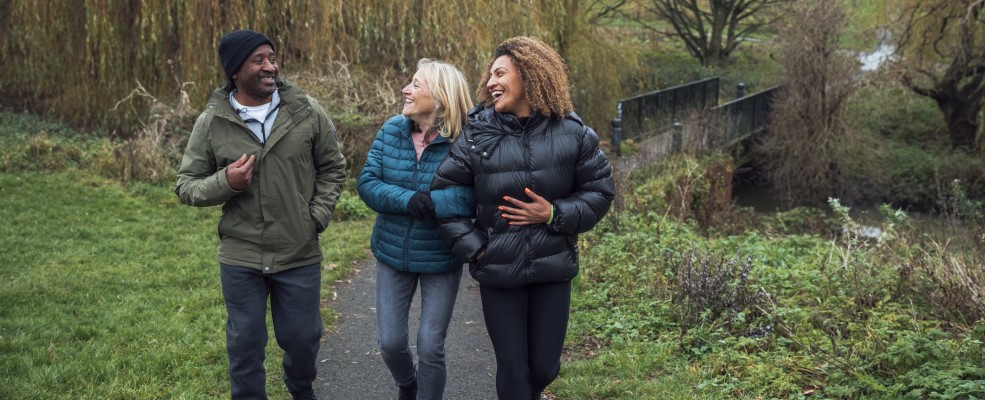Dr Elizabeth Woodcock is Research Fellow on the Social Prescribing Community of Practice research project. The project is led by Dr Koen Bartels, Associate Professor at the Institute of Local Government (Inlogov), University of Birmingham. The main research partner is The Active Wellbeing Society, a Community Benefit Society established in 2017 from Birmingham City Council’s Wellbeing Service.
Cultivating partnership working
This month we started a 12-month research project on social prescribing, thanks to a growing partnership between academic researchers and practitioners. The partnership all began with seed funding from WISERD five years ago and shows how cultivating a joint approach can bear fruit further down the line.
A social prescribing community of practice
The research project is a partnership between the Centre for Urban Wellbeing at the University of Birmingham and The Active Wellbeing Society which supports a large programme of ‘social prescribing’ activities. Social prescribing is an increasingly popular approach in the UK which aims to address the wider, non-medical issues that affect people’s wellbeing, by helping them take part in community-based activities.
We want to find out how social prescribing can change underlying inequalities in people’s wellbeing. We see people’s wellbeing as the outcome of multiple social, economic and environmental factors that affect our ability to live a ‘good life’. These factors often interact with each other, creating systematic inequalities in people’s capacity for wellbeing. For example, one problem for social prescribing is that it relies on GP referrals, but some groups of the population tend not to visit the GP.
By bringing together local residents, community groups, policymakers and academics in a ‘community of practice’, we’ll create ways for all these people to share their different kinds of knowledge about wellbeing, social prescribing and inequalities.
The SPARC network
The project has arisen through our work as a group of academic researchers and practice partners from Wales, England and Scotland, with whom established the SPARC network in 2022. We’re all interested in asset-based approaches to social prescribing, which build on people’s strengths and community assets to enhance wellbeing, hence the group’s name: ‘Social Prescribing Assets and Relationships in Communities’. We’re also interested in assets-based approaches to research, including ‘action research’, a participatory approach with an explicit aim of transforming inequalities. We want to understand whether combining these practice and research approaches can reduce systematic inequalities in wellbeing.
Through our regular meetings, we learn from each other’s current projects. By conducting a joint scoping study and co-writing a position paper and joint applications for research grants, we have come to understand how to combine participatory research methods with the innovative approaches to social prescribing of our practice partners. Our guiding theory is that to transform systematic inequalities, stakeholders need to put community assets and needs at the centre of efforts to co-produce social prescribing with communities.
WISERD seed funding
The network and current research project were given a kick-start by WISERD in 2018. Co-director of WISERD at the time, Howard Davis and Head of School, Martina Feilzer, facilitated a cross-disciplinary workshop to create a sense of community following restructuring of schools in the University.
As a PhD researcher, I was part of a group that pooled ideas for research around Welsh language, communities and social prescribing. My then co-supervisor, Dr Koen Bartels, took the idea forward and WISERD awarded us some seed funding. We engaged a wide range of practitioners and academic researchers, undertook a thematic literature review and developed a research focus on transforming wellbeing inequalities and responsibilities.
WISERD’s initial support enabled us to attract further grants and extend the network. In 2019, we held a partnership-building workshop with co-sponsorship from the Institute of Local Government (INLOGOV) and the Institute for Advanced Studies at University of Birmingham. In 2022, the University of Birmingham also provided funding from its Covid support programme. We developed a position paper for future research and produced an annotated bibliography of academic and grey literature, with the help of INLOGOV research associate Owen Powell.
Our hope as a network is that this 12-month research project, funded by Research England’s Participatory Research Fund will act as a pilot for a larger comparative study of assets-based approaches to social prescribing across the four nations of the UK.
An invitation
The SPARC network is open to anyone interested in learning how to co-produce better health and wellbeing outcomes and systems change with local communities. Besides our bi-monthly sessions, we offer a range of resources, including a LinkedIn group, bibliography of relevant work, and other research outputs. If you’d like to join us, we invite you to contact us via email or on LinkedIn.

